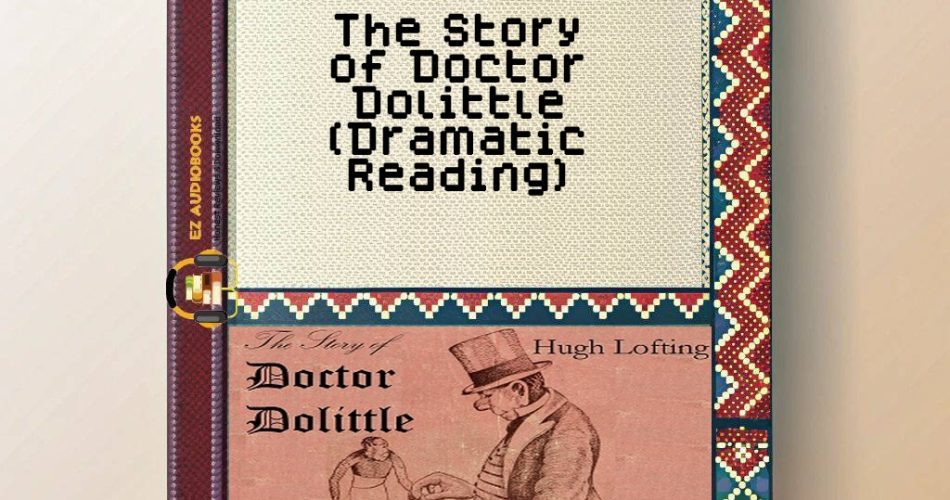Audiobook Sample
Listen to the sample to experience the story.
Please wait while we verify your browser...
- Title: The Story of Doctor Dolittle (Dramatic Reading)
- Author: Hugh Lofting
- Narrator: LibriVox Volunteers
- Length: 02:28:39
- Version: Abridged
- Release Date: 01/01/2016
- Publisher: LibriVox
- Genre: Audio Theatre, Drama
- ISBN13: SABLIB9787681
The first time I heard animals speak, I was seven years old, crouched behind my grandmother’s chicken coop in Puerto Rico, convinced I’d decoded the secret clucks and squawks. That childhood magic comes rushing back with LibriVox’s dramatic reading of “The Story of Doctor Dolittle”, where Hugh Lofting’s 1920 classic blossoms anew through the warmth of volunteer voices. This audiobook isn’t merely narrated – it’s performed, with different actors bringing to life the menagerie of characters that swirl around our kind-hearted protagonist.
Listening to this production while riding a rickety train through the Peruvian Andes last month, I was struck by how Lofting’s tale of interspecies communication mirrors my own travel experiences – those precious moments when shared smiles and gestures transcend language barriers. The doctor’s journey from human physician to animal linguist unfolds with gentle humor and wonder, particularly in scenes like his first breakthrough conversation with his parrot Polynesia. The ensemble cast captures each creature’s distinct personality – from the crocodile’s rumbling bass to the duck’s quacking pragmatism – creating an audio tapestry that feels like stumbling upon a secret animal council in some hidden jungle clearing.
Yet this listening experience requires historical context goggles. Lofting’s problematic depictions of African characters (particularly Prince Bumpo’s exaggerated dialect) land like discordant notes in an otherwise harmonious symphony. The LibriVox performers handle these sections with as much sensitivity as the original text allows, but modern listeners should prepare for cringe moments that reflect 1920s colonialism. It’s a valuable teaching opportunity about how even well-intentioned stories can perpetuate harmful stereotypes – something I’ve encountered repeatedly in my research on travel literature’s complicated legacy.
What shines brightest is the story’s core philosophy: that understanding thrives when we listen beyond our own species. The audio format magnifies this theme, transforming Dolittle’s veterinary practice into a vibrant linguistic crossroads. When the Cat’s-Meat-Man suggests the career change, you can hear the doctor’s epiphany in the narrator’s voice – a subtle shift from weary frustration to childlike excitement that reminded me of Oaxacan grandmother’s storytelling cadence. The production’s homemade charm (occasional uneven audio levels and all) adds authenticity, like overhearing villagers recount a beloved legend.
Compared to other animal-centric classics, this dramatic reading stands apart by emphasizing community. Unlike “The Jungle Book’s” solitary Mowgli or “Charlotte’s Web’s” barnyard duo, Dolittle builds a multispecies family. The collaborative narration mirrors this theme beautifully – a chorus of volunteer voices embodying Lofting’s vision of interspecies harmony. While the 1998 Eddie Murphy film adaptation leans into slapstick, this audio version preserves the story’s quieter wonders, like the moonlit conversation with the seals that made me pause my hike through Chilean salt flats just to savor the scene.
For contemporary listeners, I recommend pairing this with Katherine Applegate’s “The One and Only Ivan” or Gerald Durrell’s “My Family and Other Animals” – works that continue Dolittle’s legacy of compassionate animal observation without the dated cultural baggage. Parents introducing this to children might preview problematic sections for discussion, just as I once explained the historical context of “Little House on the Prairie” to my niece during a cross-country road trip.
May your own adventures – whether through landscapes or storyscapes – be filled with unexpected conversations, both human and otherwise. Hasta pronto, fellow listeners.
Marcus Rivera

